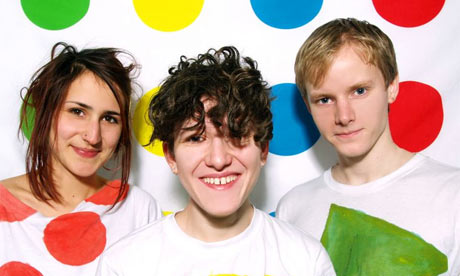There are plenty of talented women in music, but the people responsible for signing, developing and promoting them are almost always men

Mica Levi, centre, of Micachu and the Shapes. Photograph: PR
This year looks like an exciting one for female artists in the UK (they were pretty successful last year too, with Duffy outselling the majority of male pop stars). The airwaves and charts are dominated by artists like Micachu and the Shapes, Little Boots and Pixie Lott, while La Roux, Florence and the Machine, Bat for Lashes and Lisa Hannigan have been shortlisted for the Mercury prize.
But if you saw the industry panels at music conferences in the past year, you'd be forgiven for thinking that the people working behind the scenes are all white men. At a recent all-day event, there wasn't a single woman on stage (apart from the one filling the panellists' glasses with water).
Though the reality isn't as bleak as the conference would suggest, a recent study from Creative & Cultural Skills shows that 66% of people working in the music industry are male. When it comes to promotion and management work the figure rises to 77%. When Andria Vidler was appointed EMI UK and Ireland president a couple of months ago, she was the first woman to hold such a position in a major UK record company. You'd think that the music business would be more progressive than the financial sector, but it appears not.
But the part of the music industry that seems to have a complete dearth of women is record A&R (artists and repertoire). I've never come across a female A&R myself, though I've been told by someone at Universal that there are a few in their building. A male A&R at a major label says he doesn't believe the old argument that women don't want to slog around the country, spending each night at a different club. "I've known a few female talent scouts through the years, but A&Rs today tend to be former heads of indie labels, lawyers and, on rare occasions, managers, and for some reason those jobs are almost never done by women."
I asked a male manager, who has also worked on record labels, for his thoughts. He said: "How many female music anoraks do you know? Girls tend to be more interested in what the band looks like on the record sleeve than how it was recorded and how it was put together."
Caroline Elleray, head of A&R for Universal Music Publishing in the UK, takes issue with this. "I absolutely love what I do and I am a proper music anorak," she says. Elleray signed Coldplay and Keane to BMG Publishing, and helped with funding before they even had record deals. "Some days I think I need pages and pages on this subject … and then other days I think a sad face and a question mark just about covers it. There's no doubt that the music business is under-populated by women. More than any other business."
As a songwriter, I've often been told to write songs with girls in mind: "When you write for a guy, write what girls would like a guy to say to them, and when you write for a girl, say what a girl would like to say." If record companies are set on making records for girls, how come the people in charge of signing acts, guiding their development and choosing what singles they release are almost all men?
The music executives I spoke to said that there isn't a concerted effort not to employ women, but neither would they make a concerted effort to employ them. Does that mean that woman are no good at A&R or that my manager friend is right – they're just not interested? Being a confirmed "music anorak" myself, I'd say that's certainly not the case. I think that, traditionally, there's been a lack of encouragement for women trying to enter that side of the music business – and a certain amount of sexism still exists.
Last week, I was part of a music and technology panel trying to answer the question: who pays the piper? And, yes, I was the only woman (let alone the only person representing the artist community). When we took questions from the audience a man stood up, announcing that he was the head of Grokster, and now in charge of getting music licences for the soon-to–be-relaunched Pirate Bay. He addressed me as "Korean" (as it sort of rhymes with my name). Even though he was informed of my real name, he continued calling me Korean – and when I asked him what his name was, he said: "It's Wayne Rosso, but you can call me Big Daddy." The more things change, the more they stay the same.



No comments:
Post a Comment